- Yokohama-shi Top Page
- Nishi Ward Top Page
- Living and Procedures
- Community Development and Environment
- Public Works Office
- Notice
- Wisteria Flower Restoration Project
Here's the text.
Wisteria Flower Restoration Project
Last Updated January 31, 2025
- [Updated January 31, 2025] Holding a “One-year-old Fuji” management seminar
- [Updated January 27, 2025] We revised the wisteria flower regeneration map and made it a wisteria flower highlight map.
- [Updated March 15, 2021] Pruning in winter
- [Updated August 24, 2020] Survey on the effects of heat control
- [Updated July 31, 2020] Wisteria Flower Regeneration Project Newsletter
- [Updated July 10, 2020] Summer pruning
- What is the Fuji Flower Regeneration Project?
- Origin of Fujidanacho
- Efforts to date
What is the Fuji Flower Regeneration Project?
In Nishi Public Works Office, we aim to make Nishi Ward beautiful with wisteria flowersFujidana bloom all over the world through citizen collaboration.
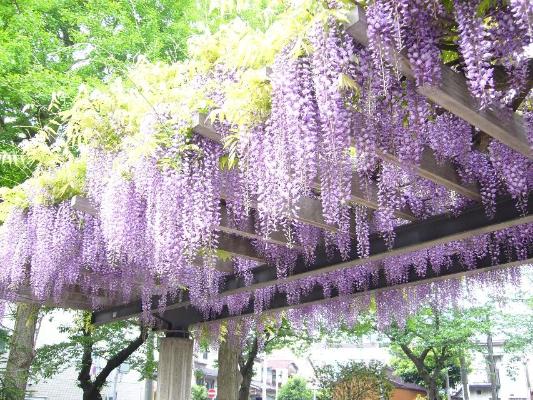
Photo of Fujidana in Hamamatsucho Park in 2008
Origin of Fujidanacho
The town name Fujidanacho is derived from "Fujidana" which was located at the eaves of a teahouse called Suzukiya in the early Meiji era. Once it was burned down in an air raid and disappeared, it was revived with the help of volunteers, and is now managed by members of the "Wisteria Shelf Preservation Society" and is a symbol of the shopping street.
Source:
・Fujidana Ichibangai homepage (outside site)
・The old days of Fujidana
Efforts to date
We will manage Fuji under the guidance of experts at eight parks in the ward managed by Nishi Public Works Office and share information with those who manage Fujidana in Nishi Ward, which will lead to the regeneration of Fujidana throughout Nishi Ward.
In the future, we will introduce the points of management work and the state of Fujidana in the ward on the Nishi Ward website and Twitter. We look forward to your support.
The investigation
Growth survey
Together with the lecturer of this project, we conducted a growth survey of Fuji at eight parks in the city. . At the time of the survey, we observed items such as the condition of the base of the Fuji and the appearance of the branches and leaves, and based on advice on this year's work, we created a Fuji growth diagnosis and growth status diagnosis chart for each park.
A growth survey
Survey on the effects of heat control
For four days from August 17 to 20, 2020, Fujidana conducted a survey on measures against heat by using a thermographic camera.
The photo shows Hamamatsucho Park at a temperature of about 34 ° C around 1:00 pm on August 20. Road pavements and park squares were red, indicating high temperatures, but the Fujidana and surrounding trees in the park are displayed in blue and yellow, indicating that measures against heat are effective.
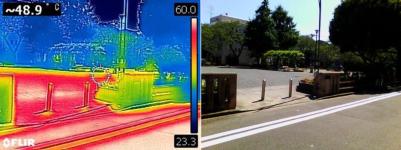
Thermo camera survey photo (far view)
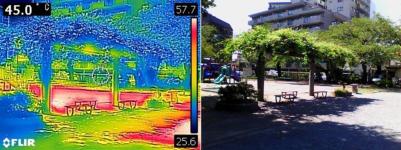
Thermo camera survey photo (near view)
The management work
Summer pruning
On Tuesday, June 23, 2020, a summer workshop was held at Hamamatsucho Park, where approximately 20 people, including facility staff who manage Fujidana in the ward and staff from Nishi Public Works Office, participated.
<List of facilities that manage Fujidana in the ward>
○Wisteria Shelf Preservation Society (Fujidana Ichibangai)
○Fujidana district center, Sakainotani Children's Log House (Nishi Ward Residents' Association)
○West Sports Center (Yokohama City Sports Association)
○Nisimae Elementary School
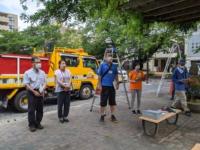
Local staff in Fujidana
First, the lecturer explained the points for cutting the vines that grew this year, and worked with the maintenance team in Nishi Public Works Office. Fuji has no flower buds on old branches, so we try to prune them at a position of 2 to 4 buds or 20 to 30 cm from the base of the thick branches, and after work, the sun shines in the light of the sun even from below Fujidana.

Summer pruning
Next, in order to deliver nutrients to the wisteria where the flowers have bloomed, chemical fertilizers with a lot of phosphoric acid components are sprayed where the roots of the wisteria are spreading. Fertilizers with a lot of phosphoric acid components are said to be effective on flowers and fruits.
Fertilization
By cutting the thick part of Tsuruya that was stretched and entangled by the summer pruning, the finish was refreshing.
The remaining seven parks in the city will be pruned in summer in July and August, so be sure to observe the Fuji of a park near you.
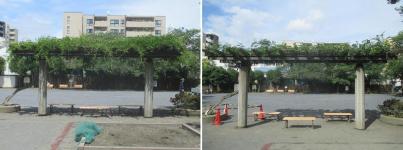
Before and after work
Group photo
Pruning in winter
On Wednesday, February 10, a winter workshop was held at Hamamatsucho Park, where about 20 people participated, including the wisteria shelf preservation party, which manages Fujidana in the first town of Fujidana, and staff from Nishi Public Works Office.
First of all, the lecturer explained how to identify the buds that become flower buds and the points to cut the branches, and performed pruning work with the Nishi Public Works Office maintenance team. "Flower buds" are easy to attach to the light brown branches that grew this year, and seem to have a rounded shape in early spring.
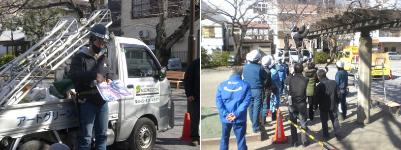
A work lecture
The day of the workshop was early and no clear flower buds could be confirmed, but I worked hard to pruning at 2 to 4 buds of new branches coming out of thick branches or about 20 to 30 cm. Did.

Pruning in winter
After arranging the overlapping branches in the pruning work, I worked on attracting them to Fujidana with a palm rope to prevent the branches from overlapping. If every leaf is exposed to sunlight in every corner, the flowering will improve, and the flowers will hang down and bloom, creating a beautiful Fujidana.

It looks like an attraction
In order to deliver nutrients to the blooming wisteria, we will combine oil cake (bone flour), cow dung compost, and bark compost at a rate of 1:1:2, dig a hole in a circle where the roots of the wisteria are spreading, and apply fertilizer. Spray it.
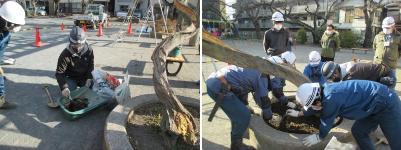
Fertilization
Pruning unnecessary branches and attracting them has made Fujidana clean. In order to regenerate the wisteria whose flowers are difficult to bloom, the flowers may be difficult to bloom if you perform strong pruning, but please observe the flowering of a nearby park from late April to early May.
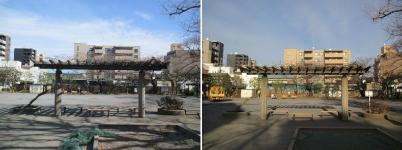
Before and after work
Holding a “One-year-old Fuji” management seminar
We are looking for participants for the "One-year-old Fuji" management workshop.
In order to make the wisteria feel closer, we will hold a workshop where experts can learn how to manage "Ichisai Fuji", which can grow in potted plants and has the property of flowering from young trees.
The image of "Fujidana" on shelves is strong, but why don't you grow potted "Ichi-year-old wisteria" at home and other places?
Outline of the event
Date and time: Thursday, March 13, 2025 9: 30-11: 00
Location: Nishi Public Works Office (Hamamatsucho 12-6)
Target: A person who grows potted "one year old wisteria" in Nishi Ward who cooperates in researching and publicizing the growth of wisteria.
Capacity: 10 people
Belongings: Gloves
★You can take home the "One-year-old Fuji" used in the workshop.
How to apply
Please apply via web page or fax.
Click here to apply on the web page.
→https://shinsei.city.yokohama.lg.jp/cu/141003/ea/residents/procedures/apply/d14f24c8-3695-4c27-8d48-a5a6332e2b85/start (outside site)
When applying by fax, please fill in the postal code, Address, name and contact information (Phone number or email address).
Application deadline: Monday, February 24
※If the number of applicants exceeds the capacity, a lottery will be held.
※The lottery results will be notified approximately 10 days before the seminar is held.
Wisteria Flower Regeneration Project Newsletter
We will tell you about the activities of the "Wisteria Flower Regeneration Project".
Wisteria flower highlight map
Wisteria Flower Highlight Map (PDF: 2,820KB)
In January 2025, the conventional "Wisteria Flower Regeneration Map" was revised to make it "Wisteria Flower Highlight Map". It is distributed at public facilities and stations in Nishi Ward. The best time to see the wisteria flowers is from late April to early May, so please take a map to visit the wisteria flowers in Nishi Ward.
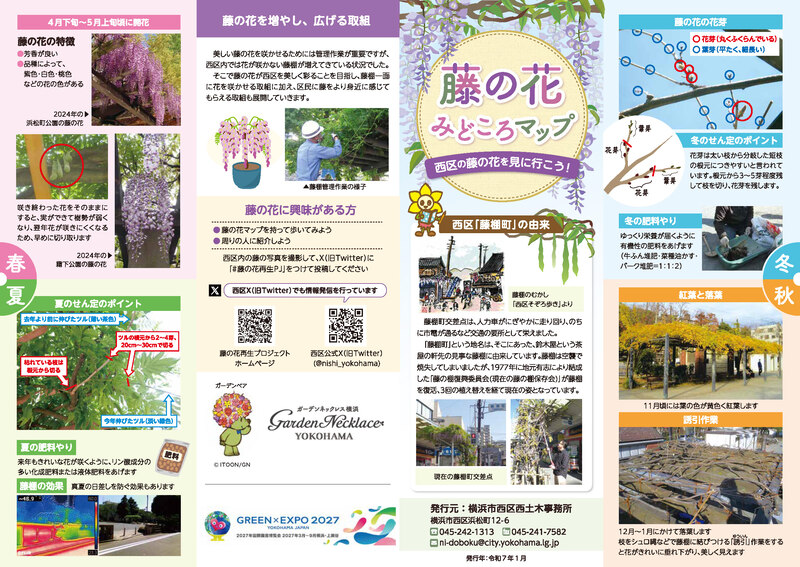
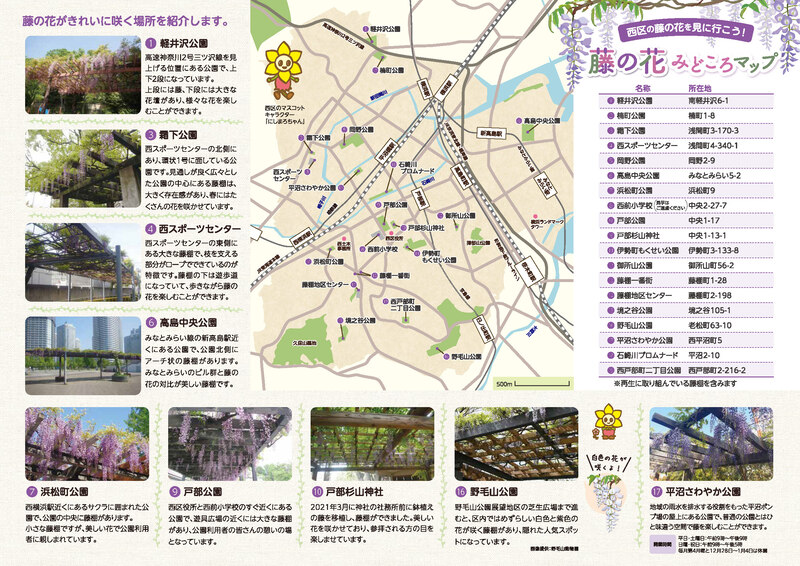
Related link
You may need a separate PDF reader to open a PDF file.
If you do not have it, you can download it free of charge from Adobe.
![]() To download Adobe Acrobat Reader DC
To download Adobe Acrobat Reader DC
Inquiries to this page
Nishi Ward West Public Works Office
Telephone: 045-242-1313
Telephone: 045-242-1313
Fax: 045-241-7582
Email address: ni-doboku@city.yokohama.lg.jp
Page ID: 360-529-157













